POMP AND THANKSGIVING.
WE do not doubt that it is quite a right thing for the Heads of t. great State to return thanks publicly for the mercy of Heaven on occasions when it has been prominently brought home to their own minds and to the minds of the people. But certainly, if we study the. precedents cited of the pro- cedure on former occasions of the kind, and read the arrangements proposed for the coming ceremony at St. Paul's, there is a strong feeling excited of the incongruity between the earthly grandeur of the proposed display and the occa- sion for which it is intended. No one can really suppose that the principal wish of the multitudes who desire accommodation in St. Paul's is to enter into the heart of a great act of praise and prayer. Of course "the lust of the eye" can hardly help having a great deal more to do with the matter than any want of the heart or soul. So far as the nation has from its heart thanked God for the Prince's recovery, we strongly suspect that it was many weeks ago, just after that sharp sensation of pity and pain, with which it had acknowledged the apparent hopelessness of his case, had been succeeded by reasonable hope. Now we can
hardly be mistaken in supposing that the whole point of the coming event is the pageantry with which it is to
be attended. We find, for instance, in the papers the most careful records of the pageantry of George M.'s thanks- giving for his restoration to health on the 23rd April, 17S9,— how the Commons, and the Masters in Chancery, and the Judges, and the Lords led the way ; bow a detachment of the Blues followed and then H.R.H. the Duke of Cumberland, "in his State coach drawn by a pair of beautiful horses ornamented with ribands, and escorted by another detachment of Blues ;" and then the Duke of Gloucester and a troop of horse ; and then the Duke of York, "in a most elegant vis-ii-vis, his servants richly dressed, with beautiful white feathers in their hats, and an escort of Guards ;" and then " a coach-and-six with the equerries of the Prince of Wales," and then his Royal Highness himself, in a State coach " drawn by six beauti- ful grey horses, ornamented with ribands," " the liveries of the Prince's servants and the hammercloth of his own carriage being of scarlet and gold and elegant beyond description ;" and so on and so on. And now of course we are going to imitate all that, and do it quite as handsomely again, if not more handsomely. The Common Council are already quite in a religious fever of display ; they desire in every respect, we are told, " to be true to their great traditions," that is, to decorate the streets of the route through which "the pageant will pass" as gaily as ever before ; and to fit up St. Paul's with such accommodation for spec- tators as can be contrived regardless of expense. Everybody is thinking,—we cannot say we blame them for it,—of the show, not of the spiritual act to be performed at St. Paul's. People are dreaming a great deal more about the ribands than about the rites ; about the liveries than about the litany or lessons ; about the splendour of the spectacle than about the spirit of their prayers. Nor will there be the excuse for all this which there is for gorgeous Church ceremonial generally,—that the very object of this gorgeous ceremonial is to express the grandeur of the spiritual power and the comparative nothingness of man. For in these cases the pomp is not ecclesiastical pomp, is not representative of the humility of the worshipper and of the grandeur of the object of worship ; but, on the contrary, is directly symbolical of the earthly majesty of the principal worshippers,—consists, in fact, in Carlyle's sense, of " clothes " of the precise kind which hide the poverty and nakedness of the individual soul from it- self, and invest it in a cloud of human pageantry. No doubt the thanksgiving itself is a grand formal acknowledgment of the power and mercy of God ; but the tendency of the whole cere- monial must be to bring much more emphatically into relief the power and grandeur of the chiefs of the State. The voice of thanksgiving will go up muffled by the heavy atmosphere of the pomp through which it passes. The pageantry of the day will certainly be pageantry declaring the glory of man rather than the glory of God. The Thanksgiving service will be a public memorial of a real thanksgiving of which the ardour is mostly passed,—a grand monument to a spent wave of religious feeling rather than an expression of one now really passing through the public mind. The attention which many weeks ago was really concentrated on the prayer and the thanks, will now be concen- trated on the royal magnificence and the stateliness of the national array.
We confess we see a real incongruity between this concentration of effect on the royal processiou, and the object of the rite for which it is put in motion. The purpose of the day is a public acknowledgment of the nation's thankfulness for a granted prayer, and of the Prince of Wales's own gratitude for the divine mercy. In both cases the central point of the interest and the central point of its symbolical expression of gratitude ought to be on the religious, and not on the human side. Can anything hide this better than so careful an accumu- lation of grand effects upon the regal magnificence of the thanksgiver and his surroundings? We cannot help thinking that the truer way of expressing such a feeling of national thanksgiving would be to ac- cumulate all possible splendour and beauty about the churches and the other places of worship of the whole United Kingdom, to have thanksgiving everywhere, while the Prince himself and those personally interested in his restoration to health should have gone in strict privacy and without any marks of State or splendour, to mingle their thanks with those of the people. If the mercy of God means anything on such an occasion, it means something so great, that the natural mode in which kings should recognize it, would seem to be more by a careful putting off of all their worldly grandeur, than by a putting it on. These are occasions in which the heart and soul ought to be engaged, if the service is to be a real one.
And if they are so engaged, is not the very first thought of the no- thingness of that rank of which earth makes so much,—of The cer- tainty that the soul of a monarch, when it comes to be stripped of all adventitious aids, will be on an exact equality with the soul of the poorest peasant in his dominions,—of that effacement of dignity and wealth and power which comes in the presence of death? How could this be better symbolized amongst us than by the attempt to realize on the day of thanksgiving that spiritual equality which had been more than realized when the Prince seemed to be breath- ing out his last breath on a bed of fever? How could it be better symbolized than by reserving all our poor attempts at glory for the buildings in which God is worshipped amongst us, and as far as possible ignoring the showy external .side at least of those petty distinctions of rank which in the pre- sence of God appear so trivial, and are, at all events, so fatal to the influence of true devotion ? It may be said that after all it was for the heir to the Throne that the nation prayed, and that, therefore, in any true thanksgiving service, there should be no artificial attempt to conceal his public rank and position, since it is for his preservation as heir to the Throne that the people wish to give God thanks. Of course, that is so far true, that had he not been heir to the Throne the popular feeling would have been much less marked, much less ardent ; but then, if it was for his real happiness and good, for his spirit and not merely for his succession to the royal inheritance, that the people prayed, what they would need to realize most, and probably what he himself would need to realize most, is the weakness and helplessness of the spiritual part of the man, and not his grand position which they can see illustrated in any State pageant whatever. The opportunities are sufficiently few in which either a prince or a nation strips off the conventional signs of rank which so mislead and distort our imagi- nation here, and the Sovereign, or future Sovereign, appears to himself and to them simply as one of the creatures of God. Surely a national thanksgiving for God's granting of the people's prayers for the Prince,—if we believe that God did grant the people's prayers,—should be one such occasion,—to be distinguished by a marked absence of earthly pomp rather than by its presence ;—and if by splendour at all, by splendour lavished on the symbols of the divine power and presence, not on the grandeur of the human worshipper. The pomp of the 27th February will certainly not be pomp of this kind. It will, if it resemble the 23rd April, 1789, be a day on which the Prince of Wales will realize more vividly than ever before the grandeur of his earthly position, and perhaps feel more difficulty than ever in disrobing himself, even in the very act of divine worship, of those interior trappings which popularity, rank, and power gradually weave around the heart.



































 Previous page
Previous page